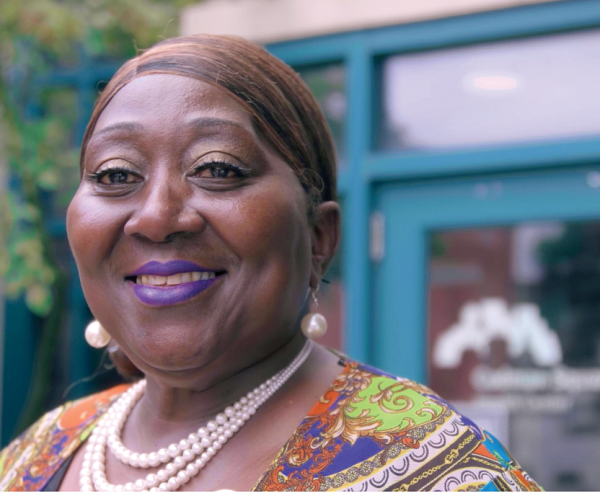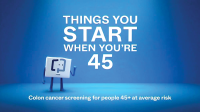March 27, 2024

Jo-Ann Winbush, who works at Codman Square Health Center, is highlighted in a new city campaign to encourage residents to get screened for colorectal cancer.
Boston Public Health Commission photo

An extensive communication campaign launched by the Boston Public Health Commission and the Colon Cancer Coalition this week is aimed at increase awareness about the different types of colon cancer screening and the ways to combat one of the few known preventable cancers.
The commission’s 2023 Health of Boston Cancer Report found that colorectal was the fourth-highest type of cancer mortality in 2021, down from the second-highest in 2020 and 2019. The report also found that Black men and Black women were the two groups with the highest rate of mortality during the period 2019-2021.
Dr. Bisola Ojikutu, the executive director of the BPHC, explained that these statistics were exactly why the campaign was necessary.
“Campaigns like this are incredibly important to increase the health literacy across Boston,” she said. “Nationally, the overall lifetime risk of developing colorectal cancer is one in 24 … and it’s preventable and treatable, so learning more about it is incredibly important.”
Another more worrying factor behind the campaign, Ojikutu said, is the fact that a recent trend has emerged of younger and younger patients being diagnosed with a more progressed form of the cancer. It is recommended that everyone over the age of 45 be screened once every ten years, or more frequently if, at one of those screenings, a cancerous growth or polyp is found and removed.
Mark Kennedy, spearheading the campaign at the BPHC, said a major focal point of the campaign is that there are alternatives to colonoscopies, which, he says, many people have an aversion to – primarily, “stool-based” or FIT tests.
“[A colonoscopy] is the gold standard test,” Kennedy said, “so if you’re at higher risk and you know it, that’s likely what you’ll have to do. Average-risk people or people that don’t know what their risk is can do a FIT [fecal immunochemical test] and start there. It’s very highly regarded.”
There are several “non-modifiable risk factors” with colon cancer, Kennedy said, that make some people more predisposed to developing it than others. Diet and exercise are two primary factors, as well as having the hereditary condition known as Lynch syndrome, which can be tested for as early as late teens, Kennedy said, adding that if you have a family history of colon cancer, it may be due to Lynch syndrome, but having that history without the syndrome still increases your risk.
Kennedy said the campaign will touch all corners of the city , but mainly will focus in areas that are predominantly Black and where the primary languages spoken are Spanish and Haitian Creole.
“We tried to create some local flavor, if you will,” Kennedy said. “And we’ve chosen champions, or people that are highly recognizable and very well known in each of these communities, to spread the word.”
The six champions are Ibram X. Kendi, a Boston University researcher who was diagnosed with colon cancer in his thirties; Alberto Vasallo, the CEO of El Mundo Boston; Jo-Ann Winbush, a nurse who has been at the Codman Square Health Center for 31 years; Marta Rivera, the commissioner of Boston Centers for Youth & Families; Dieufort Fleurissaint, more well-known as “Pastor Keke,” in Mattapan as founder of the True Alliance Center, which assists and advocates for recently-arrived migrants from Haiti; and Brenda Lormil-Raymond, an oncology nurse practitioner at Mass General who also does advocacy work for the Haitian community.
A seventh champion, Adjoa Anyane-Yeboa, is a gastroenterologist at Mass General who “can disseminate our medical information as someone who is an actual clinician” through a recorded video, Kennedy said.
Videos from the champions will play in waiting rooms, and through Kennedy’s presentations to the community, he said.
But the campaign doesn’t end there: local newspaper advertisements, posters and postcards, social media, bus shelters, PSAs over the radio, and “feet on the street” engagement from Kennedy himself and other organizations like Union Capital Boston and the Youth Advisory Board at BMC are all going to be used to spread the word.
“We’ve got all the communication channels covered,” Kennedy said.
Bryan Maule, a Boston resident who was diagnosed with colon cancer in December of 2020, has undergone one surgery and estimates that he has completed about 50 rounds of chemotherapy. He still fights the disease today.
“It’s so important that folks get screened, even with the home tests if that’s all they can do,” Maule said. “I mean, I was diagnosed at 40, and my doctor said the cancer might have been growing for seven or eight years before, so that’s well before the guidelines say to start getting screened, at 45. If I didn’t start having symptoms, I wouldn’t have known.”
Maule says the BPHC campaign will underscore the severity of the risk of not getting screened, adding that he was diagnosed only a few months after the actor Chadwick Boseman — of Black Panther fame— died from the same disease.
“If you’re not sure you’re at risk, just give it a shot,” Maule said. “Don’t wait for celebrities to die from it.”


